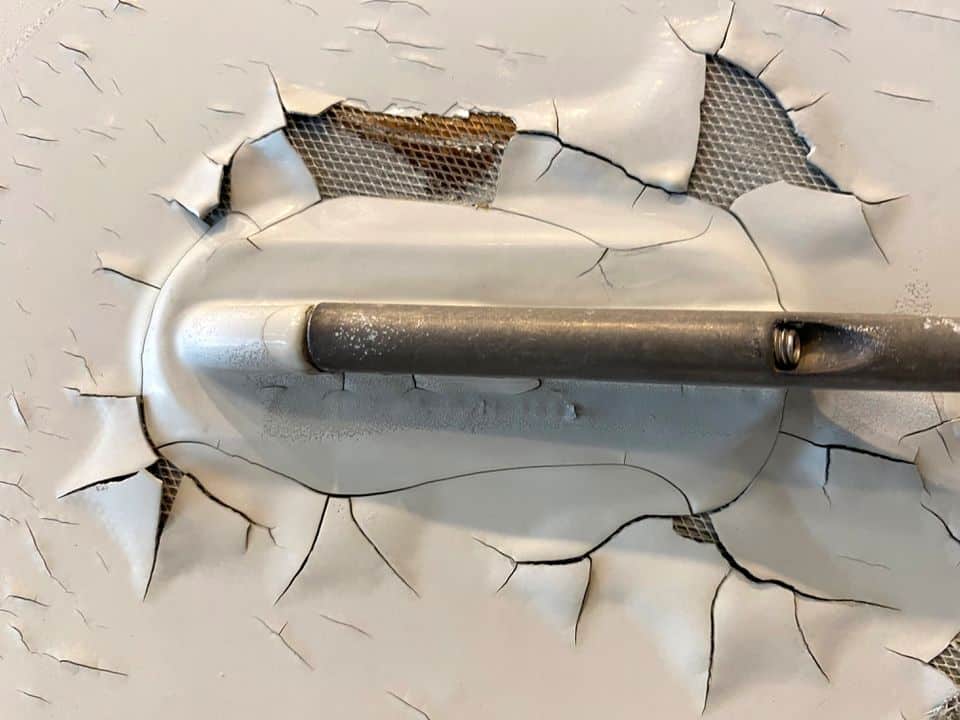Airbus recently announced it was cancelling the remaining 19 A350 orders from Qatar Airways. This is a major step in the year-long conflict between the European aircraft manufacturer and the Gulf airline, but it does not in any way end the legal battle.
In this post we will look back at how this case unfolded and the possible consequences for both parties.
Paint problems on the A350s and a grounded fleet
In August 2021, Qatar Airways announced that paint defects on its A350s were causing them to be grounded due topotential safety risks, with the fuselage exposed to the elements without any protection.
La cThe airline will later publish photos illustrating its words, followed by Reuters.ompagnie publiera plus tard des photos illustrant ses propos, suivie par Reuters.
Reuters will also publish a video in June.
In fact, to be precise, it is not Qatar Airways that decided to ground its planes but the Qatar Civil Aviation Authority. Believing it had suffered a loss because it could not operate the aircraft it had paid for, the airline asked Airbus to remedy the situation and to pay$200,000 per aircraft per day of downtime. Today, the total amount is 1.4 billion dollars for 23 immobilized aircraft.
Airbus, for its part, has acknowledged the problem and announced that they are doing everything possible to solve it, but refutes the fact that it presents the slightest risk in terms of safetyand therefore refuses to pay any compensation.
So far, nothing but logical behaviors by two parties who are each trying to protect their interests and one could expect that, as is often the case, everything would be settled around a table and in the greatest discretion.
But this was not the case.
Escalation and first order cancellation
Qatar is in a hurry to reach a settlement and therefore decides, in December 2021, to bring the case to the British High Court of Justice instead of having recourse to independent arbitration as Airbus preferred.
In the meantime,Qatar Airways has refused delivery of two new A350s while waiting for the case of its existing aircraft to be settled. It took advantage of the situation to sue Airbus, asking for 600 million dollars in compensation for the damage suffered by the immobilization of its aircraft.
In the wake of this,Airbus will claim 200 million in damages for the delivery refused by the airline.
Airbus’ reaction was swift and certainly a first in the airline world. While order cancellations are generally the result of contract renegotiations, conversion of an order for one aircraft into an order for another, or even an airline’s poor financial position, they are generally amicable and the airline is the one that initiates them.
Nothing like that here: Airbus has unilaterally cancelled an order for 50 Airbus A321Neo aircraft for the Qatari airline. Despite challenges from the latter, the High Court of Justice in London has authorized the European aircraft manufacturer to reallocate production slots for these aircraft to other airlines, despite the fact that Qatar Airways paid 330 million dollars in advance on this order, estimated at 6 billion dollars.
So much for the legal aspect of the A321Neo case. But the A350 story is not over.
Pyrrhic victory for Qatar and second order cancellation
In July, the two parties met again in court, this time because Airbus is refusing to disclose certain information and documents to Qatar Airways under a “blocking” law that allows it to withhold sensitive information during investigations by foreign authorities.
In the meantime Airbus had cancelled the delivery of two new aircraft.
If some of the requests of the airline on other subjects were rejected, the judge gave it on the point mentioned above, arguing that this French law did not apply in this precise case.
Now the trial can be held, but Qatar is no further ahead.
In the wake of this, Airbus last week cancelled the rest of the A350 order, which still included 19 aircraft.
The two parties will meet againin court in June 2023for the final round and the determination, or not, of the responsibilities of the aircraft manufacturer and the possible compensations due to the airline.
The European side continues to hope for an amicable settlement in the meantime, but its opponent now seems determined to see things through.
See you in 2023…unless there are other twists in the meantime.
With this context in mind, we can then ask ourselves some questions.
Do paint defects affect the safety of the aircraft?
For lack of being experts in the matter, we will rely on the advice of the competent authorities.
According to the European authorities (EASA) this is not the case at all, according to the Qatari authorities there is a safety issue.
Who to believe? One can already legitimately question the independence of both of them with respect to their “local champion”. However, other airlines than Qatar Airways seem to experience the same problems without reacting as strongly. They would be Finnair, Etihad, Cathay Pacific and Air Caraibes.
Would the Qatari authority have given a hand to its national airline?
In the absence of unanimous and clear-cut expert opinions, we leave it to you to make up your own mind.
Is there a prejudice for Qatar Airways?
From the moment aircraft are grounded due to a defect the answer seems to be obviously yes. But it’s more complicated.
According to EASA, there is no safety problem, so the decision of the Qatari authorities (if it was not taken at the request of the airline to protect it) is unfounded. If we rely on the Qatari authority, there is of course a prejudice.
We will only know for sure when an independent expert has pronouncedon the real consequences of the painting problem, which is a prerequisite for judging the legitimacy of the decisions taken so far.
However, the prejudice, if it exists, is to be relativized by the fact that the airline would not have paid the “leasers“ owners of the planes, because of this defect. In this case, if it missed an opportunity to make money, it didn’t lose any either.
By the way, can we imagine an action by the leasers against Airbus?
On the other hand, in our opinion, there is an undeniable image damage: planes in such a state deteriorate the image of the airline and I think that any passenger would not be reassured by boarding such an aircraft. When you are the best airline in the world, an image damage is anything but negligible.
Is there a prejudice for Airbus?
Airbus has already argued that Qatar Airways’ refusal to take delivery of two aircraft is detrimental to the company.
We can also think of an image damage for the European aircraft manufacturer... provided that in fine the justice considers the position of Qatar disproportionate to the risk.
Did Airbus lose big?
Without mentioning the possible damages, Airbus has just cancelled 6+7=13 billion of orders. This is no small thing.
However, this is not “so” catastrophic. Airbus, like Boeing, have full order books for several years and the only thing that will change is that airlines that were supposed to take possession of A321Neos and A350s in several months or years will have to wait less time. By then other customers will come.
Yes, Airbus will miss the opportunity to make 13 billion dollars in its pockets, but it won’t end up with unsold aircrafts. Over the life of the A350 and A321Neo programs, these amounts should be put into perspective.
Will they lose Qatar as a customer? In the short term certainly, in the medium or long term everything can change quickly in these cases where each one tries to bluff more than the other so we don’t know. And it isnot certain that this suits Qatar either.
Let’s see why…
What is the outlook for Qatar Airways?
Today, things are simple: buy exclusively from Boeing. Today the airline operates aircraft from both manufacturers, so this is not a problem for it.
Moreover, an order of 737MAX has been placed to compensate for the loss of the A321Neos.
But in the long run this is not a desirable situation for the airline. In a market in the form of a duopoly, the airlines are putting the two main manufacturers in competition with each other, and it will be difficult for Qatar to negotiate from a position of strength with Boeing, knowing that they have no other option than to go through the American manufacturer.
What will happen next?
The two protagonists are expected to meet in court in June 2023 for the final battle. In the meantime, anything can happenin this game of liar’s poker where each one gives blow for blow to the other and where one plays bluff and intimidation.
An amicable settlement is possible even if it seems unlikely today. As are other claims on the most diverse grounds, just to keep the pressure on the opponent.
One thing is certain, Qatar certainly has even less desire to be left without a way to negotiate with Boeing than Airbus does to lose Qatar as a customer. But with Akbar Al Baker, the colourful Chairman of Qatar Airways, the borderline between defending his business and simple ego issues is never far away. And since Airbus knows how to defend itself, this can turn into a dialogue of the deaf, even if no one has an interest in it.
Bottom line
Following painting problems that would affect the safety of its A350s, Qatar Airways has refused deliveries and attacked Airbus. In response, Airbus cancelled orders and sued the airline.
The outcome of the case will not be known for another year, but until the courts determine the responsibilities of each party, and for the moment the two businesses do not give a very good image.
For now, the only winner in the story is…Boeing.
Image : Qtar Airways A350 by Jaromir Chalabala via Shutterstock
























